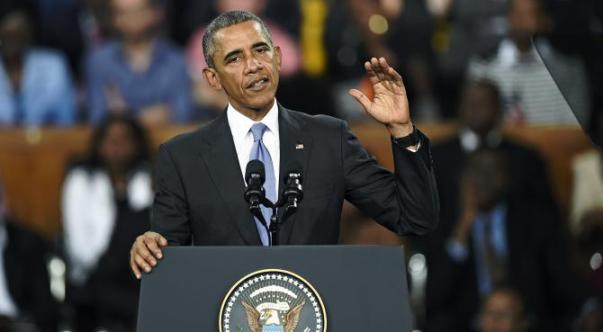| |||||||||
|
|||||||||
|
By:
THEODORE R. JOHNSON III | |||||||||
| Posted:
Aug,12-2015 17:35:22
| |||||||||
|
President Barack Obama's visit to his father's homeland concluded on a Sunday with an address to nearly 5,000 young Kenyans in an indoor arena just outside Nairobi. There,he toldthe adoring crowd, "I am proud to be the first American president to come to Kenya, and of course, I'm the first Kenyan American to be president of the United States."
The historic visit was international news, but Obama's description of himself as Kenyan American for the first time was newsworthy in its own right.
Though some may write off his use of the description as mere pandering to a local crowd, the usage offers additional insight into the nation's first black president and the sometimes testy relationship he has had with African Americans over the course of his presidency. This tension, admittedly minuscule in comparison with the immense pride African Americans have in having helped elect him, usually surfaces whenever the president brings his seemingly tailor-made message of respectability and hard work to African-American audiences.
While the admonition plays well in black immigrant communities, ithas increasingly come under firein African-American communities. But this is the oft-discussed dream the president received from his Kenyan father.
From the moment Obama entered the national stage, his race has been the topic of substantial discussion. His white American mother and black Kenyan father complicated the tendency we have to rely on simplistic characterizations of race and ethnicity. Was he biracial, black American or African American? The implication, of course, is that he could not possibly be all three. But in his bookThe Audacity of Hope,the president refers to himself using each of these terms, meaning that he sees himself as all of them at once and none of them exclusively. This is exactly right.
Knowing exactly which nation his people are from, while also living a black existence in America for most of his life, allows the president an uncommon identity that straddles the line between Kenyan American and African American. This, along with his life experience,gives him an immigrant outlook on America as well as an African-American understanding of it.
It is this immigrant view that's at the core of his respectability and twice-as-good sermons to African Americans, seen inhis commencement addressat Morehouse College and remarks at events for his My Brother's Keeper initiative. Although respectability politics are not unique to black immigrants (see Bill Cosby's infamousound cake speech), professor Christina Greer, author ofBlack Ethnics:Race, Immigration and the Pursuit of the American Dream,writes,"African immigrants present an interesting portrait of optimism in the belief that hard work is the fundamental crux of American success," and many of them believe in the "{merits of hard work alone" to achieve the American dream.
Ironically, this exaltation of hard work is also found in the white Protestant beliefs prevalent in the Midwest, where President Obama's mother was from, and resonates quite well politically with the American public. It is a principle with wide appeal that comes across as race neutral. In other words, trading on the value of this concept helped Obama win the presidency and re-election.
But recently, as his time in office winds down, we are seeing a different President Obama. Asothers have observed, he is much closer today to the president African Americans thought he'd be after winning the 2008 election. That is, he is championing African-American policy concerns and giving voice to them in a way not seen before in his presidency.
This current iteration of the presidentspoke plainly about racism in the criminal-justice systemin front of the NAACP, sang "Amazing Grace"at a funeral in a historic black church, told the nation to retire the Confederate battle flag to museums and evenused the n-word in a public interview.he president who brought respectability themes to African Americans without the accompanying bold policies to dismantle structural racism is now bringing messages of reform that specifically benefit African Americans, includingcommuting sentencesfor some prisoners given excessive penalties for drug offenses.
His chastisement of African-American behavior seems to have been replaced by chastisement of the system of subjugation that prevents African Americans from only having to work hard to get ahead.
President Obama has long been guarded on sensitive questions around race, probably a necessity to win the presidency twice. But his recent freedom, even to declare himself a Kenyan American, gives us a little more insight into the motivations of our first black president. His African-immigrant values imparted to him by his father and his African-American experience present a duality of blackness that may not have been fully appreciated before his trip to Kenya. As such, it is probably now more accurate to say that the growth we've seen in him over the last six years is really just a more transparent display of the fluidity of his identity.
| |||||||||
|
Source:
| |||||||||
|
||||||||||||||||||||||||||||||||||||||||||||||||||||||||||||||||||||||||||||||||||||||||||||||||||||||||||||||
|
||||||||||||||||||||||||||||||||||||||||||||||||||||||||||||||||||||||||||||||||||||||||||||||||||||||||||||||


.jpg)




